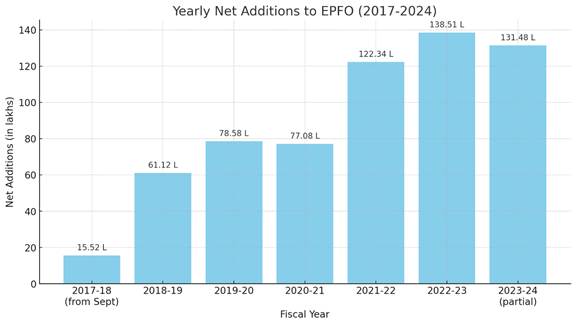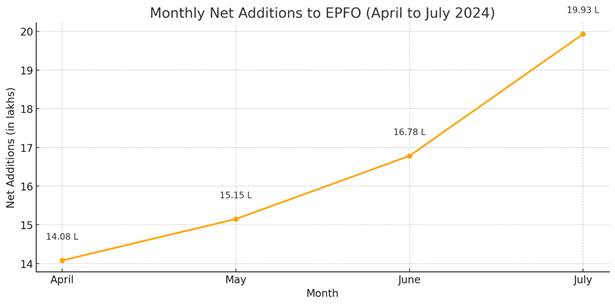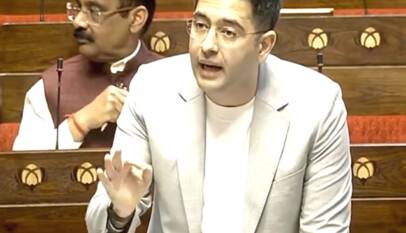The Transition of India’s Economy Towards Formalization
India’s economy is currently undergoing a transformative shift marked by an increasing trend toward formalization—a process that is redefining job structures, employment security, and social benefits for millions. This change is of profound importance for India’s workforce, as it ensures that a larger segment of the population is covered by social security systems, offering them greater economic stability and a more secure future.
The Employee’s Provident Fund Organisation (EPFO) stands as a vital institution in this journey, managing a long-term savings scheme and social security benefits for salaried workers across the country. By tracking and supporting the formalization process, the EPFO not only provides critical financial safety nets but also plays a pivotal role in transitioning the workforce toward a more organized and protected structure
What is Formalization of the Economy?
Formalization is when jobs move from the informal sector (small, unregistered businesses and daily wage workers) into the formal sector (where employees have contracts, job security, and access to benefits). In the formal economy, workers enjoy legal protections like a fixed salary, healthcare benefits, paid leave, and retirement savings. This change is crucial because it ensures that more people are covered by social security systems, making their lives more stable and secure.
In simple terms, formalization means bringing more workers under the umbrella of government regulations and benefits, so they are not left vulnerable to economic ups and downs.
What is EPFO and How Does it Benefit Workers?
The Employee’s Provident Fund Organisation (EPFO) is a government body in India that manages a savings scheme for salaried workers. The EPF scheme is like a long-term savings plan, where both employees and employers contribute a small portion of the salary every month. This amount accumulates over time and can be withdrawn at retirement or during emergencies.
The Benefits of EPFO are manifold, providing crucial support and security to employees throughout their careers and into retirement. Firstly, EPFO ensures financial security by establishing a retirement fund that employees can rely on as they age, offering a significant support system in their later years. Additionally, insurance coverage is provided through life insurance benefits under schemes like the Employees’ Deposit Linked Insurance (EDLI), ensuring that members have a safety net in case of unforeseen events. Upon retirement, workers become eligible for a monthly pension, which delivers a steady income during their golden years, enhancing their financial stability. Moreover, EPFO offers flexibility with medical and emergency withdrawals, allowing members to withdraw funds for essential needs such as medical emergencies, educational expenses, or purchasing a home, thereby making it a highly versatile financial tool that adapts to various stages and demands of life.
In short, the EPFO acts like a safety net, ensuring that workers are better protected and have some financial stability.
How EPFO Registration Reflects Increased Formalization
When a worker registers with the EPFO, it means that they have a formal job where their employer is contributing to their social security. More EPFO registrations indicate that more jobs are moving into the formal sector, meaning more people are getting access to the benefits and security mentioned above. It’s a sign that the Indian economy is becoming more organized, with companies following regulations to support their employees better.
What the Data Tells Us: A Story of Progress
According to the data provided by EPFO:
- Since September 2017 to July 2024, over 6.91 crore members have joined EPFO. This means that nearly 7 crore people have transitioned to more secure, formal jobs.
- The trend reflects India’s push towards formalizing its workforce, leading to better job security for employees.

*Reserve Bank of India’s KLEMS database
- Looking at recent trends:
- In the fiscal year 2022-23, 1.38 crore new members joined EPFO.
- From April to July 2024, the monthly registrations have been steadily increasing, with nearly 20 lakh new members added in July alone.
- June 2024 EPFO data shows:
- Job Switching and Fund Transfer: Many members switched jobs and rejoined EPFO-covered establishments, opting to transfer their accumulated funds rather than applying for a final settlement. This move helps secure their long-term financial well-being and ensures continued social security protection
- Youth Joining the Workforce: The trend aligns with earlier data, showing that a significant portion of individuals joining the organized workforce are youth, primarily first-time job seekers.
- Increase in Female Members: The rise in female member registrations highlights a positive shift towards a more inclusive and diverse workforce.
- This shows positive momentum in job creation, indicating a strong labour market and growing formalization.

*Reserve Bank of India’s KLEMS database
To illustrate this, consider a scenario involving Ramesh, a 35-year-old factory worker from a small town in India. For most of his career, he was paid in cash daily, without any job security. If he fell sick, he lost a day’s wage. If the factory shut down, he was left without income
But recently, Ramesh’s factory owner decided to register the business with the EPFO. This changed everything for Ramesh:
- Now, Ramesh gets a fixed salary every month, which goes directly into his bank account.
- His employer contributes to his EPF account, giving him a safety net for retirement.
- Ramesh also benefits from life insurance and has access to medical withdrawals if his family faces an emergency.
- Knowing that he has a retirement fund and job security has given Ramesh peace of mind. He can plan for his children’s education and even think about buying a small house one day.
This shift has transformed Ramesh’s life. And he’s not alone—millions of workers across India are feeling the same benefits as more jobs become formalized.
Moving Towards a More Secure Future
The journey towards formalizing the Indian economy is a positive one. The EPFO data clearly shows that more people are getting access to secure, formal jobs every year. This is not just a number—it’s about improving the quality of life for workers like Ramesh, who now have the financial security to plan for their future.
By increasing formal job registrations, India is building a stronger, more resilient workforce. It means that even during tough times, like the COVID-19 pandemic, there is a safety net to protect families.
The increase in EPFO registrations is a strong indicator that India’s workforce is becoming more organized and secure. It reflects the country’s progress toward a formalized economy where workers are protected and empowered. As India continues to move in this direction, millions of workers will enjoy better job security, social benefits, and a brighter future.
Odisha positions itself as Eastern India’s leading clean energy investment destination
• Odisha Renewable Energy Investor Conclave 2026 successfully mobilized ₹67,000 crore in i…




















